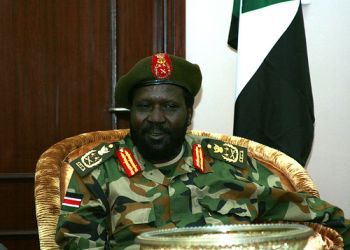S. Sudan’s Kiir says unified forces to graduate with sticks
December 1, 2021 (JUBA) – South Sudan’s President Salva Kiir said unified forces will graduate with sticks owing to the arms embargo imposed by the United Nations.
The embargo, he said, limits abilities to procure arms for troops in training camps.
In July 2018, the Security Council imposed an arms embargo on South Sudan’s territory, legally obliging all UN member states to prevent direct or indirect supply, sale or transfer of arms and related material, including ammunition, military vehicles and spare parts. The embargo, according to the UN, also extends to technical support, training, financial or assistance related to military activities.
“We have repeatedly informed the UN system about the negative impact this has on the implementation of Chapter 2 of the [peace] agreement, and all we have received in return are more conditions that do not recognize progress achieved so far,” Kiir said while officially closing the five-day governor’s forum on Monday.
He said his government was facing three challenges in the implementation of Chapter 2 of the Revitalized Peace Agreement and called for reasonable demands in the negotiation of unified forces and command structure.
“We have repeatedly informed the UN system about the negative impact this has on the implementation of Chapter 2 of the Agreement, and all we have received in return are more conditions that do not recognize progress achieved so far,” said Kiir.
He added, “As things stand, we will have no option other than to graduate these forces with sticks”.
The South Sudanese leader also cited the divergent views on the command structure of the unified army as another major challenge the country faces.
“Conventionally, army formation starts at the lowest level: from a squad all the way to a division. From this structural setup, it follows that the rank of commissioned officers must correspond with the levels of army units they are deployed to lead,” explained Kiir.
He added, “For our case, there are parties who have submitted a list composed of senior officers, starting from colonel upward. If we accept such a submission, how will the leadership of a unified army be expected to maintain its coherence, accountability, and control of personnel”?
The South Sudanese leader urged parties to the September 2018 revitalized peace agreement to address issues of inflated ranks and unreasonable demands when discussing ways of constituting the unified army command structure.
“The third and final challenge is the failure of the parties to reach consensus on percentage allocation of the new unified army among themselves. There are those saying that 45% of the unified army be allocated to other parties while the government takes the remaining 55%,” stressed Kiir.
He added, “To us, what is consistent with arrangements in the Revitalized Peace Agreement is the ratio of 60% to the government and the remaining 40% to other parties”.
The President emphasized the need for law and order to allow people to engage in productive activities, giving instruction to governors and chief administrators to work within lawful means to apprehend those who disrupt peace and harmony within states and administrative areas.
Under the September 2018 revitalized peace agreement, South Sudan is supposed to graduate 83,000 unified forces drawn from the various parties to take charge of security during the ongoing transitional period.
(ST)

